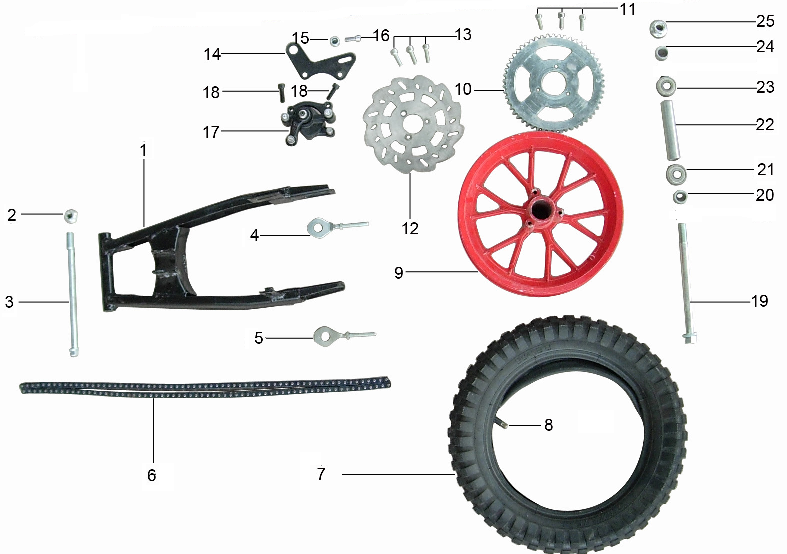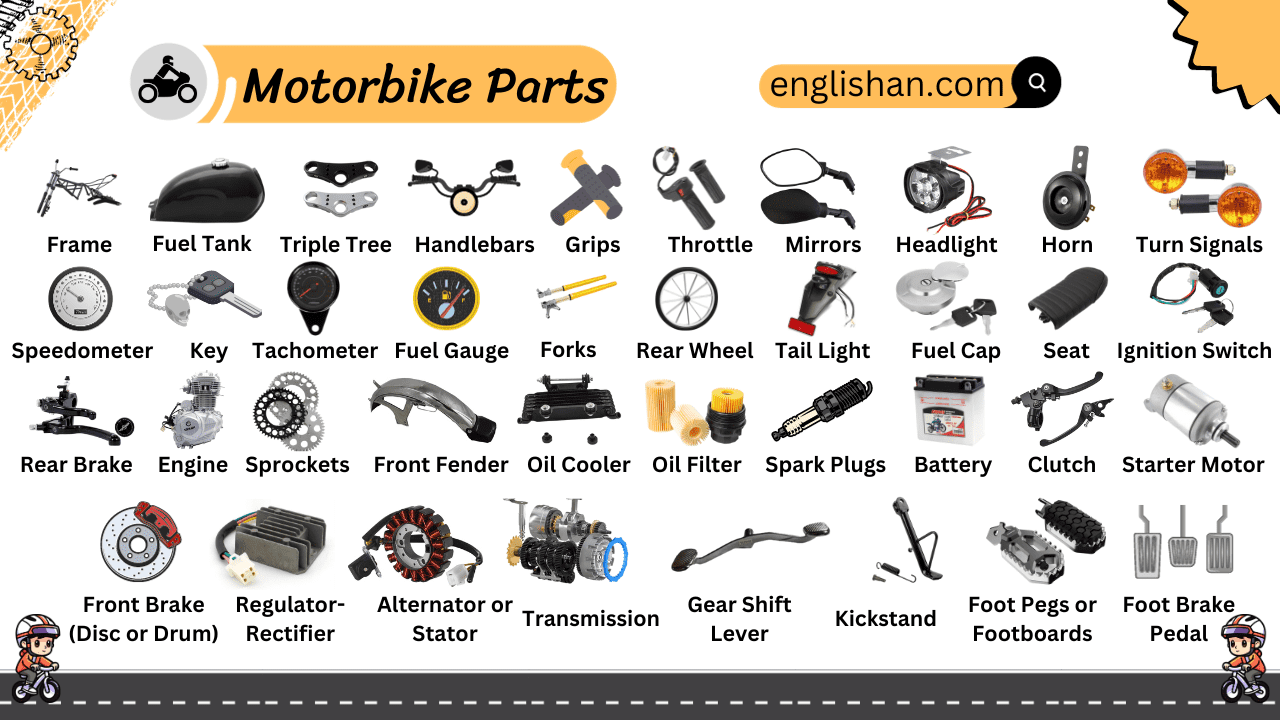A Deep Dive Into Performance Tuning with Bike Parts Wellington
A Deep Dive Into Performance Tuning with Bike Parts Wellington
Blog Article
Discover the Vital Motorcycle Parts You Required for Optimum Performance
Recognizing the crucial parts of a motorcycle is fundamental for accomplishing peak performance. Each part, from the engine to the stopping system, plays a vital role in general functionality and security. Normal upkeep can protect against unanticipated failures and boost the riding experience. Lots of cyclists neglect the complexities of these systems. Discovering exactly how they interact can result in an extra reliable ride. What critical elements should every motorcyclist prioritize?
The Engine: The Heart of Your Motorcycle
The engine offers as the core part of a motorcycle, driving its performance and specifying its capacities. It is accountable for transforming fuel right into power, which powers the bike ahead. Numerous types of engines are utilized, including single-cylinder, V-twin, and inline configurations, each offering distinctive attributes suited for different riding styles and purposes. The engine size, normally measured in cubic centimeters (cc), substantially influences performance, with larger engines typically supplying even more power and torque.Furthermore, the engine's layout and innovation, such as gas shot systems or air-cooling versus liquid-cooling, influence performance and reliability. Maintenance is essential for peak operation; variables like normal oil changes and checking stimulate plugs assurance longevity. Cyclists often consider an engine's responsiveness and level of smoothness, as these characteristics improve the total riding experience. Inevitably, the engine remains a vital element that specifies not only the motorbike's efficiency but likewise the cyclist's connection to the equipment.
The Transmission: Shifting Gears Smoothly
The transmission plays an important duty in a motorbike's efficiency, especially in the mechanics of equipment shifting. Recognizing exactly how to change equipments efficiently can boost the overall riding experience, while regular maintenance warranties peak performance. Proper focus to these aspects can significantly affect the long life and efficiency of the motorcycle.

Equipment Shifting Mechanics
Smooth gear moving is important for perfect motorcycle performance, significantly affecting both acceleration and control. The mechanics of equipment moving involve the communication between the clutch, gear lever, and transmission system. When a cyclist engages the clutch, it disengages the engine from the transmission, enabling an equipment change without harming the components. A well-timed release of the clutch, incorporated with exact activity of the equipment bar, helps with a smooth adjustment between equipments. This procedure ensures that the engine operates within its ideal power band, enhancing performance. Motorcycle Parts Auckland. In addition, recognizing the gear ratios and their effect on speed and torque can aid cyclists make notified choices during shifts, ultimately adding to an extra enjoyable and receptive riding experience
Maintenance Tips Value
Regular upkeep plays a crucial duty in guaranteeing that the transmission system runs effectively, permitting smooth gear shifts. Frequently examining and altering the transmission fluid is essential, as old liquid can bring about raised friction and wear. In addition, inspecting the clutch for wear assurances peak engagement and disengagement, protecting against slippage during equipment modifications. Lubrication of relocating parts is just as vital to minimize friction and boost performance. Motorbike proprietors should additionally monitor for leakages and unusual sounds, as these can show underlying issues. By sticking to these maintenance pointers, cyclists can prolong the life-span of their transmission system, ensuring that equipment changes remain smooth and adding to the total performance of their motorbike.
The Braking System: Ensuring Safety on Every Experience
Braking systems are essential elements that straight affect a motorcycle's safety and efficiency. They include different parts, consisting of brake pads, blades, calipers, and hydraulic lines, all collaborating to guarantee efficient deceleration. The kind of stopping system-- usually either disc or drum-- influences responsiveness and quiting power.Regular maintenance is important to support peak efficiency; used brake pads can result in decreased efficiency and raised quiting ranges. Additionally, the top quality of brake liquid must be kept an eye on, as it can absorb dampness with time, compromising braking efficiency.Riders need to also think about the relevance of anti-lock braking systems (ABDOMINAL), which protect against wheel lockup during sudden quits, boosting total safety and security. Effectively working brakes are not practically stopping; they instill self-confidence in the biker, enabling for safer navigation via various terrains. Eventually, a dependable braking system is vital for delighting in every experience with comfort.
The Suspension: Enhancing Convenience and Control
A well-functioning suspension system greatly contributes to a motorbike's general efficiency, enhancing the effectiveness of the stopping system. The suspension plays a significant duty in taking in shocks from uneven surfaces, assuring a smoother adventure while preserving tire contact with the roadway. This call is important for both stability and control, permitting cyclists to navigate corners with confidence and precision.Different sorts of suspension systems, such as telescopic forks or mono-shocks, provide varying degrees of comfort and handling. Correctly tuned suspension boosts responsiveness, supplying the rider with a much more connected feeling to the motorcycle. Routine upkeep checks are essential to determine the suspension components, including springtimes and dampers, are functioning at their best. An efficient shock absorber not only elevates the riding experience yet also adds to the long life of various other motorcycle components by reducing damage. Therefore, buying quality suspension is important for any kind of major motorcycle enthusiast.
The Tires: Attaching You to the Road
Tires play an essential duty in a motorcycle's efficiency, acting as the primary link between the roadway and the cyclist. Recognizing the different kinds of tires readily available can considerably influence handling and security. Furthermore, routine maintenance is vital to guarantee peak tire performance and durability.
Tire Keys In Explained
Just how do different tire types influence a motorbike's efficiency? Tire types play an important role in establishing a motorcycle's grasp, security, and handling. Sport tires, designed for high performance, deal boosted traction and responsiveness on paved roads, making them perfect for racing and hostile riding. On the other hand, exploring tires prioritize longevity and convenience, giving a smoother adventure for long-distance travel. Off-road tires, identified by their sturdy step patterns, master grip on unpaved surfaces, suitable for experience lovers. In addition, dual-sport tires blend features from both on-road and off-road classifications, satisfying functional riding requirements. Ultimately, choosing the appropriate tire kind is important for optimizing efficiency, making sure safety, and boosting the general riding experience.
Upkeep Tips Offered
While riding when driving, keeping ideal tire condition is vital for safety and efficiency. On a regular basis examining tire pressure is essential, as under-inflated tires can result in inadequate handling and enhanced wear. It is suggested to inspect step deepness often; worn tires concession grasp and security. In enhancement, motorcyclists ought to seek indicators of damage, such as lumps or splits, which can show the demand for replacement. Rotating tires regularly assures even use, boosting long life. Maintaining tires tidy from debris and avoiding too much visuals can lengthen their life-span. Ultimately, keeping appropriate placement and equilibrium adds to peak efficiency, lessening tension on various other bike parts. Adhering to these upkeep tips will significantly boost the general riding experience.
The Gas System: Fueling Efficiency and Effectiveness
The fuel system plays a crucial role in taking full advantage of a motorbike's performance and effectiveness, as it guarantees the ideal shipment of gas to the engine. It consists of numerous essential elements, consisting of the gas container, gas pump, gas filter, and fuel injectors or carburetor. Each component needs to function effectively to ensure a effective and smooth ride.The gas tank shops gasoline and provides it to the engine via the fuel pump, which generates the essential stress. A gas filter prevents pollutants my site from entering the engine, while the injectors or carburetor mix gas with air for combustion.Proper maintenance of the gas system is crucial; a blocked filter or malfunctioning injector can bring about reduced efficiency and boosted gas consumption. By validating that the fuel system runs effectively, riders can take pleasure in improved throttle reaction, far better fuel economy, and on the whole boosted riding experience.
The Electric System: Powering Your Experience
An efficient electrical system is essential for the total functionality and security of a motorbike, as it powers crucial parts such as the ignition, lights, and numerous digital systems. This system consists of the battery, which shops energy, and the generator, responsible for producing power while the engine runs. The circuitry harness attaches these elements, making sure reputable linked here power distribution.Additionally, integrates safeguard the system from overloads, while relays help control high-current gadgets with low-power signals. A well-maintained electrical system boosts efficiency by ensuring smooth beginnings and regular operation of signals and lights, essential for cyclist presence and safety.Regular checks of the battery's fee and links are essential for stopping electrical failings. Riders should also inspect electrical wiring for deterioration, making certain all components work ideally. Inevitably, a durable electrical system contributes considerably to the overall performance and reliability of the motorbike.
Frequently Asked Questions
How Typically Should I Change My Motorbike's Battery?
The regularity of bike battery replacement depends upon use and maintenance (Oem Parts New Zealand). Normally, batteries ought to be replaced every 3 to 5 years. Routine checks can help recognize when a replacement is necessary for peak efficiency
What Devices Do I Need for Standard Motorbike Maintenance?
For standard motorcycle maintenance, one needs important tools such as an outlet collection, wrenches, screwdrivers, pliers, tire pressure scale, and a torque wrench. These devices help with reliable upkeep and assure the motorcycle runs effectively and securely.
Exactly How Can I Enhance My Motorbike's The rules of aerodynamics?
To improve motorcycle aerodynamics, one should consider adjusting fairings, utilizing windshield expansions, optimizing body position, and lowering total weight. These modifications help decrease drag, improving stability and gas performance throughout adventures.
What Are the Signs of a Failing Electrical System?
Indications of a falling short electrical system consist of dimming lights, trouble starting, irregular instrument readings, and blown merges. Motorbike Components NZ. Unusual scents or deterioration around battery terminals might likewise indicate underlying issues requiring immediate attention for safety and efficiency

Exactly how Do I Pick the Right Oil for My Motorcycle?
When picking oil for a bike, one should take into consideration the maker's specifications, thickness ratings, and the kind of riding. Furthermore, artificial versus standard oil can affect efficiency and engine protection, affecting the decision substantially. The engine size, normally measured in cubic centimeters (cc), considerably influences performance, with larger engines generally providing more power and torque.Furthermore, the engine's layout and technology, such as fuel shot systems or air-cooling versus liquid-cooling, impact performance and dependability. A well-functioning suspension system substantially adds to a motorcycle's total performance, complementing the performance of the stopping system. The fuel system plays an essential role in maximizing a motorbike's performance and effectiveness, as it assures the optimal delivery of gas to the engine. A gas filter prevents pollutants from getting in the engine, while the injectors or read this post here carburetor mix fuel with air for combustion.Proper upkeep of the gas system is critical; a blocked filter or malfunctioning injector can lead to reduced efficiency and boosted fuel usage. A well-kept electric system boosts performance by guaranteeing smooth beginnings and constant procedure of signals and lights, essential for rider presence and safety.Regular checks of the battery's fee and connections are essential for protecting against electric failures.
Report this page